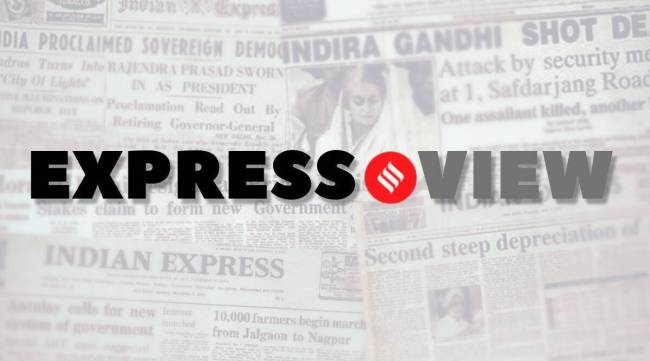Opinion Express View: Opposition needs much more than caste census to make a national case
Be it by courting non-dominant groups within the OBC category, or the most deprived or less mobilised sub-castes within the SCs, or by now reaching out to Pasmanda or backward caste Muslims with its labharthi politics, the BJP has sought to coopt Mandal and combine it with Mandir, often successfully.
 Mandal politics, across the regions, was also energised by the powerful pledge of social justice; it led to the emergence of new leaders and mobilisation of new constituencies that contributed to the deepening of democracy.
Mandal politics, across the regions, was also energised by the powerful pledge of social justice; it led to the emergence of new leaders and mobilisation of new constituencies that contributed to the deepening of democracy. Campaigning in Karnataka on Sunday, Rahul Gandhi called for a caste census and for the removal of the 50 per cent cap on SC/ST/OBC reservation. These issues are not new, of course. But the fact that Gandhi raises them now, alongside the Adani matter that he has been highlighting single-mindedly, is significant. In the immediate term, it can be read as Gandhi’s attempt to counter the anti-OBC charge that the BJP has tried to smear him with ever since his 2019 Kolar jibe on corruption and “Modis”, which also led to his disqualification from Parliament after a conviction for defamation. In the longer term, ahead of 2024, it could be that Gandhi and the Congress, on the one hand, and parties striving for elusive Opposition unity on the other, have converged on “social justice” as their slogan and glue. In doing so, they acknowledge the renewed resonance and salience of a politics centred on caste quotas in times of shrinking jobs and economic opportunities. The Congress unveiled a social justice package at the AICC plenary in February, which included promises of private sector quotas, a separate OBC ministry, reservation in the higher judiciary. And more recently, DMK leader and Tamil Nadu Chief Minister M K Stalin organised a national conference of the All India Federation for Social Justice, in which several non-BJP parties participated. But the renewed focus on caste and social justice also recalls an older Opposition strategy: The deployment of Mandal to cut into the consolidation for Mandir.
 In the 1990s, the tumultuous decade in which Mandal and Mandir, alongwith Market, rearranged the country’s politics, the BJP’s national homogenising project was sought to be splintered by a more regional caste-centric politics. Mandal politics, across the regions, was also energised by the powerful pledge of social justice; it led to the emergence of new leaders and mobilisation of new constituencies that contributed to the deepening of democracy. For a time, the strategy seemed to work against the BJP. But replicating it now, several decades on, is fraught with challenges. For one, the flagbearers of Mandal have let it down. Instead of forming larger coalitions of the backward, many of these parties have shrunk into fiefs of the dominant backward castes, often controlled by families. If the Mandal promise has been undercut by the Mandal party, it has also been confronted over the years by the challenge of the BJP’s steady incursions into Mandal territory. Be it by courting non-dominant groups within the OBC category, or the most deprived or less mobilised sub-castes within the SCs, or by now reaching out to Pasmanda or backward caste Muslims with its labharthi politics, the BJP has sought to coopt Mandal and combine it with Mandir, often successfully.
In the 1990s, the tumultuous decade in which Mandal and Mandir, alongwith Market, rearranged the country’s politics, the BJP’s national homogenising project was sought to be splintered by a more regional caste-centric politics. Mandal politics, across the regions, was also energised by the powerful pledge of social justice; it led to the emergence of new leaders and mobilisation of new constituencies that contributed to the deepening of democracy. For a time, the strategy seemed to work against the BJP. But replicating it now, several decades on, is fraught with challenges. For one, the flagbearers of Mandal have let it down. Instead of forming larger coalitions of the backward, many of these parties have shrunk into fiefs of the dominant backward castes, often controlled by families. If the Mandal promise has been undercut by the Mandal party, it has also been confronted over the years by the challenge of the BJP’s steady incursions into Mandal territory. Be it by courting non-dominant groups within the OBC category, or the most deprived or less mobilised sub-castes within the SCs, or by now reaching out to Pasmanda or backward caste Muslims with its labharthi politics, the BJP has sought to coopt Mandal and combine it with Mandir, often successfully.For Opposition parties in search of a binding glue, then, the challenge remains daunting. There is no readily available platform or tidy agenda that can help them to jointly take on the BJP. Such a platform, such an agenda, will need to be pieced together, bit by bit. There is simply no alternative to the labour of politics.







